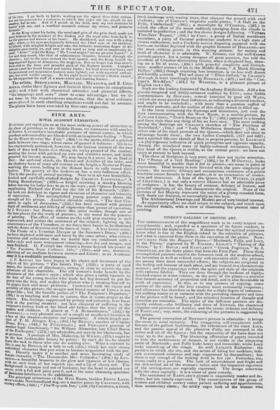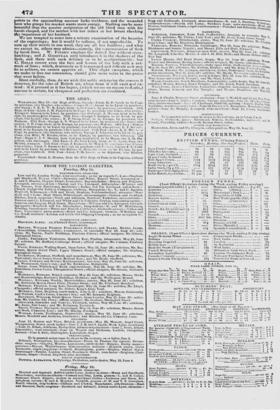FINDEN'S GALLERY OF BRITISH ART.
THE commencement of this magnificent work is in every respect un- exceptionable; and, regarded as a specimen of its future conduct, is satisfactory in the highest degree. It shows that the spirited projectors know what is due to the English school in the selection of pictures, and what is expected from them in the execution of the plates. NEW- TON'S scene from the Beggars' Opera—" Macheath, Polly, and Lucy, in the Prison," engraved by W. }Innen ; Ls.sLIE's " Taming of the Shrew," by C. ROLLS; and EASTLAKE'S " Greek Fugitives," by J. Goonvesa, are the three plates that form the First Part. These three accomplished painters stand in the foremost rank of the modern school, for invention as well as refined taste and executive skill the pictures are among their most successful efforts ; the subjects are congenial to the feeling and humour of each artist, and are treated in a characteristic manlier; and the engravings reflect the spirit and style of the originals with extreme fidelity. They are done through the medium of highly.. finished copies in water colours, on the scale of the plates--a practice that insures accuracy of proportion and detail, and is also favourable to truth of expression. In this, as in any process of copying, some portion of the spirit of the first creation must necessarily evaporate; and allowance has therefore to be made for a slight degree of tameness: but nothing coarse or at variance with the pervading character and tone of the picture will be found ; and the minutest beauties of thought and intention are traceable. The styles of the different painters are dis- tinctly evident,—the brilliancy and force of NEWTON, the chastened elegance and precision of LESLIE, and the ornate richness and delicacy of EASTLAKE ; nay, more, the colouring of the pictures is suggested by the prints.
The general conception of NEWTON'S picture is admirable : it brings the scene to mind instantly. The swaggering self-complacent indif- ference of the gallant highwayman, the vehemence of the vixen Lucy, and the passive appeal of the plaintive Polly, are conveyed in the action and air of the figures ; but the expression of the faces does not come up to the mark. The blustering affectation of gayety intended to hide the recklessness of despair, is not visible in the simpering smile of Alacheath ; and Polly looks Leavy and insensible, while Lucy lacks something of the virago. So with LESLIE'S Katherine : the position in which she sits, and the action of biting her necklace, indi- cate constrained calmness and rage suppressed by discomfiture ; but there is not enough of the lurking devil in her eye : Petruchio, too, seems really in a passion. The look of astonishment and fright and the deferential air of the woman's tailor, and the impatient eagerness of the serving-man, ale capitally expressed. The design otherwise tells the story capitally : it is a scene of pure comedy. The sentiment of EASTLAKE'S picture is exquisitely tender and de- licate, butt too tamely expressed. The countenances of the group of women and children convey rather patient suffering and apprehension, than momentary alarm ; the wildly eager look of the woman who.
points to the approaching succour lacks vividness, and the wounded hero who grasps his musket wants more energy. Nothing can be more beautiful than the passive resignation of the old blind man with his bands clasped, and the mother with her infant at her breast checking the impatience of her husband.
We are tempted to enter into a minute examination of the beauties of the engravings; but it would be tedious, if not unprofitable. To sum up their merits in one word, they arc all but faultless ; and what we except to, others may admire-namely, the representation of flesh by harsh lines. W.
;MEN employs the dotted line without cross. hatching; and J. GOODYEAR only introduces it in the shadows of the flesh, and there with such delicacy as to be unobjectionable : but C. Rot-Ls covers even the face and bosom of the lady with a net- work of lines; which, dextrously as it is managed and difficult as it may
be to achieve, we cannot approve of This slight exception, which we make to free our conscience, should give more value to the praise that went before.
Most cordially, then, do we wish this noble enterprise the success it deserves, for the sake of British art, whose fame it will exult and ex- tend : if proceed as it has begun, (which we see no reason to doubt,) success is certain, for cheapness and perfection arc combined.



























 Previous page
Previous page